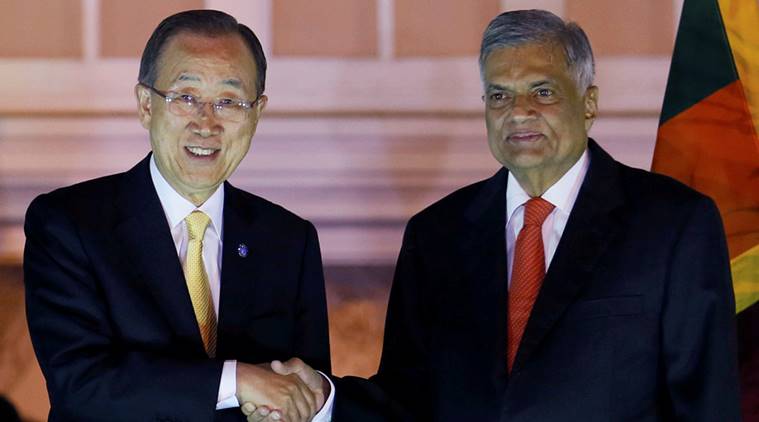(This meet will focus on peace, reconciliation and reconstruction efforts since 2009.)
By: PTI | Colombo .
Secretary-General of the United Nations Ban Ki-moon (L) shakes hands with Sri Lanka’s Prime Minister Ranil Wickremesinghe at their meeting during Ban’s three-day official visit, in Colombo, Sri Lanka, August 31, 2016. REUTERS/Dinuka Liyanawatte Secretary-General of the United Nations Ban Ki-moon (L) shakes hands with Sri Lanka’s Prime Minister Ranil Wickremesinghe at their meeting during Ban’s three-day official visit, in Colombo, Sri Lanka, August 31, 2016. REUTERS
United Nations Secretary-General Ban Ki-moon on Wednesday met Prime Minister Ranil Wickremesinghe in Srilanka as he began his second Sri Lanka visit focused on reconciliation efforts since 2009, when the Lankan troops Tamil Tigers and came under close UN scrutiny for its war crimes accountability.
The UN chief and the Lankan premier held close-door talks soon after Ban arrived in Colombo, officials said.
“The two men were likley to focus on peace, reconciliation and reconstruction,” they said but did not give the details.
Earlier today, Ban was received at the Bandaranaike International Airport here by Deputy Foreign Minister Harsha de Silva. The UN chief, who is on a three-day visit, would call on President Maithripala Sirisena tomorrow and visit the Sinhala-majority southern city of Galle.
And on Friday, he will visit the camps of persons displaced by the conflict in the northern district of Tamil-dominated Jaffna, also a former LTTE bastion. He is scheduled to speak at an event in Colombo on September 2 on ‘Sustaining Peace – Achieving Sustainable Development Goals’.
This is Moon’s second visit to Sri Lanka in seven years. He visited the country days after the Sri Lankan troops defeated the Liberation Tigers of Tamil Eelam and ended the nearly 30-year separatist campaign in May 2009.
Since that visit, Lanka came under close UN scrutiny for its war crimes accountability during the war with the LTTE. It triggered an internal probe into UN’s conduct during the final stages of the war during which the top world body estimated that nearly 40,000 civilians were killed.
The UN has been pushing for a special court to investigate the allegations. Sri Lanka dismissed the figure as “excessive” but the UN human rights councilpassed three consecutive resolutions since 2012 demanding accountability for warcrimes blamed on both the government troops and the LTTE.
indianexpress.com
